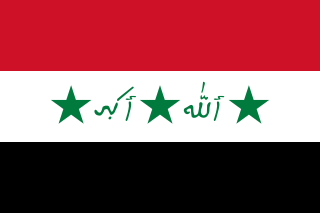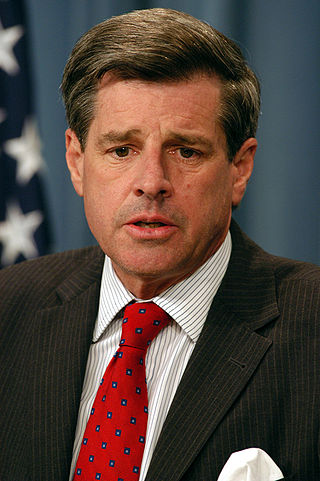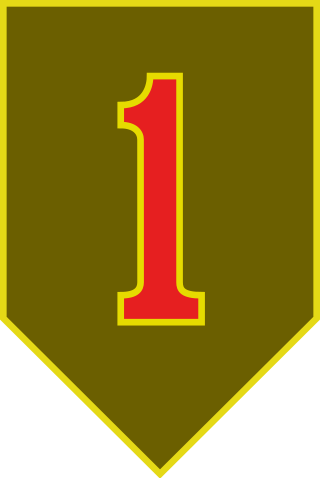
The Coalition Provisional Authority was a transitional government of Iraq established following the invasion of the country on 19 March 2003 by U.S.-led Coalition forces. The invasion marked the fall of Ba'athist regime led by Saddam Hussein.

Lewis Paul Bremer III is a retired American diplomat. He was the second de facto head of state of Iraq as leader of the Coalition Provisional Authority (CPA) following the 2003 invasion of Iraq by the United States, from May 2003 until June 2004.

The Occupation of Iraq (2003–2011) was characterized by a large United States military deployment on Iraqi territory, beginning with the US-led invasion of the country in March 2003 which overthrew the Ba'ath Party government of Saddam Hussein and ending with the departure of US troops from the country in 2011. Troops for the occupation came primarily from the United States, the United Kingdom, and Australia, but 29 other nations also provided troops, and there were varying levels of assistance from Japan and other countries, as well as tens of thousands of private military company personnel.

The Iraqi Ground Forces, or the Iraqi Army, is the ground force component of the Iraqi Armed Forces. It was formerly known as the Royal Iraqi Army up until the coup of July 1958.
The Iraqi Intelligence Service also known as the Mukhabarat, General Intelligence Directorate, or Party Intelligence, was an 8,000-man agency and the main state intelligence organization in Iraq under Saddam Hussein. The IIS was primarily concerned with international intelligence collection and analysis but also performed many activities inside Iraq in conjunction with the Directorate of General Security as a secret police organization.

The Iraqi Police (IP) is the uniformed police force responsible for the enforcement of civil law in Iraq. Its organisation, structure and recruitment were guided by the Coalition Provisional Authority after the 2003 invasion of Iraq, and it is commanded by the reformed Iraqi Ministry of the Interior. "IP" refers to the Iraqi Police, and "ISF" to the broader Iraqi security forces. The current commander of the Federal Police Forces is Lieutenant General Raed Shaker Jawdat.

David Howell Petraeus is a retired United States Army general and public official. He served as Director of the Central Intelligence Agency from September 6, 2011, until his resignation on November 9, 2012. Prior to his assuming the directorship of the CIA, Petraeus served 37 years in the United States Army. His last assignments in the Army were as commander of the International Security Assistance Force (ISAF) and commander, U.S. Forces – Afghanistan (USFOR-A) from July 4, 2010, to July 18, 2011. His other four-star assignments include serving as the 10th commander, U.S. Central Command (USCENTCOM) from October 13, 2008, to June 30, 2010, and as commanding general, Multi-National Force – Iraq (MNF-I) from February 10, 2007, to September 16, 2008. As commander of MNF-I, Petraeus oversaw all coalition forces in Iraq.
A Military Transition Team or Transition Team, commonly abbreviated as MiTT, in the context of the United States Military, is a 10 – 15 soldier team that trains foreign national and local security forces. The term has been used in the "War on Terror" to designate groups training the Iraqi Security Forces in particular. By comparison, Afghan Army and other Afghan security forces are mentored and trained by US Embedded Training Teams (ETTs) and the Operational Mentoring and Liaison Teams (OMLTs) of other nations.
The Iraqi Armed Forces are the military forces of the Republic of Iraq. They consist of the Iraqi Army, the Iraqi Air Force, and the Iraqi Navy. Along with these three primary service branches, there exists the Iraqi Counter Terrorism Service and the Popular Mobilization Forces. The President of Iraq acts as the supreme commander as outlined by the constitution.

Multi-National Corps – Iraq (MNC-I) was a formerly multinational, later U.S. only, army corps created on 15 May 2004, fighting the Iraq War. Its superior body, the Multi-National Force-Iraq (MNF-I) had replaced Combined Joint Task Force 7 on May 15, 2004. The change was made due to "concerns that had existed for some period of time, that the Combined Joint Task Force 7 headquarters was not sufficient to handle the range of military operations in Iraq, including peace support, civil military operations, and at the same time conduct strategic engagement such as talking to the sheiks and talking to the political authorities."
Multi-National Security Transition Command – Iraq (MNSTC-I) was a training and organizational-support command of the United States Department of Defense. It was established in June 2004. It was a military formation of Multi-National Force – Iraq responsible for developing, organizing, training, equipping, and sustaining the Iraqi Ministry of Defense (MoD), with the Iraqi Armed Forces, including the Iraqi Counter Terrorism Service; and the Ministry of Interior (Iraq) with the Iraqi Police and Border Enforcement, Facilities Protection, and other forces. It was headquartered in the International Zone in Baghdad at Phoenix Base, a former elementary school.

The Iraq Assistance Group (IAG) was a joint service U.S. military command responsible to Multi-National Corps Iraq. It coordinated military transition teams assisting the reborn Iraqi Army, the Federal Police, the Department of Border Enforcement, Ports of Entry Directorate and the provincial police. These teams provided partnership, mentoring and training to assist their Iraqi partners in achieving full operational effectiveness and facilitating the transition of internal security to Iraqi control. The Iraq Assistance Group itself was a joint command formed from the U.S. Army's 1st Infantry Division and composed of mostly Army soldiers but also including a sizable contingent of sailors, airmen and marines as well as members of foreign militaries.

The U.S. Army Combined Arms Center (USACAC) is located at Fort Leavenworth and provides leadership and supervision for leader development and professional military and civilian education; institutional and collective training; functional training; training support; battle command; doctrine; lessons learned and specified areas the Commanding General, United States Army Training and Doctrine Command (TRADOC) designates in order to serve as a catalyst for change and to support developing relevant and ready expeditionary land formations with campaign qualities in support of the joint force commander.

The Ministry of Interior (MOI) is the government body charged with overseeing policing and border control in Iraq. The MOI comprises several agencies, including the Iraqi Police, Highway Patrol, Traffic Department, Emergency Response Unit, Explosive Ordnance Disposal Unit, and Department of Border Enforcement. Following passage of the Facilities Protection Service Reform Law, the Ministry absorbed FPS personnel previously spread among other ministries. The MOI has approximately 380,430 employees, and the Ministry of Finance approved US$3.8 billion for its 2008 budget, representing a 21% growth over the previous year.

The NATO Training Mission-Iraq (NTM-I) was established in 2004 at the request of the, at that point unelected, Iraqi Interim Government under the provisions of UN Security Council Resolution 1546. The aim of NTM-I was to assist in the development of collaborating Iraqi security forces training structures and institutions so that the Interim Government could build an effective and sustainable capability that addressed the needs of the newly established order. NTM-I was not a combat mission but was a distinct mission, under the political control of NATO's North Atlantic Council. Its operational emphasis was on training and mentoring. The activities of the mission were coordinated with Iraqi authorities and the US-led Deputy Commanding General Advising and Training, who was also dual-hatted as the Commander of NTM-I. The mission came to an end in December 2011.

United States Forces – Iraq (USF-I) was an American military sub-unified command, part of U.S. Central Command. It was stationed in Iraq as agreed with the Government of Iraq under the U.S.–Iraq Status of Forces Agreement. USF–I replaced the previous commands Multi-National Force – Iraq, Multi-National Corps – Iraq, and Multi-National Security Transition Command – Iraq from January 2010. General Raymond T. Odierno initially served as commanding general but he was replaced by General Lloyd Austin in September of 2010. The logo of the USF-I depicts a lamassu.

The Ground Forces Command at Victory Base Complex near Baghdad Airport was the most important fighting formation in the Iraqi Army. The headquarters of the Iraqi Ground Forces Command and the Iraqi Joint Forces Command are the same entity.

De-Ba'athification refers to a policy undertaken in Iraq by the Coalition Provisional Authority (CPA) and subsequent Iraqi governments to remove the Ba'ath Party's influence in the new Iraqi political system after the U.S.-led invasion in 2003. It was considered by the CPA to be Iraq's equivalent to Germany's denazification after World War II. It was first outlined in CPA Order 1 which entered into force on 16 May 2003. The order declared that all public sector employees affiliated with the Ba'ath Party were to be removed from their positions and to be banned from any future employment in the public sector.

The Iraqi Civil Defense Corps was an Iraqi armed formation created by the Coalition Provisional Authority (CPA) which existed in 2003–2004. The ICDC was controlled by Combined Joint Task Force 7. The idea originated from the 101st Airborne Division as a means of using unemployed former Iraqi military personnel and tribal militias to supplement the scarce U.S. military footprint.
Coalition Provisional Authority Order 1: De-Ba'athification of Iraqi Society is the first of the 100 Orders imposed by the Coalition Provisional Authority during the Iraq War. Entering into force on 16 May 2003, it describes the objectives of the de-Ba'athification policy developed by the US Office of Special Plans.














